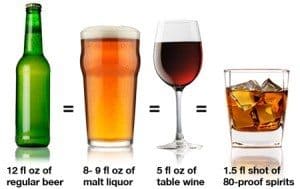Light to moderate alcohol consumption is associated with cardiovascular benefits and decreased mortality.
However, although alcohol can be used safely, it is important to acknowledge that anything more than “moderate” can be detrimental to health.
Excess alcohol intake is associated with increased mortality and many disease conditions. Among these are diseases of the liver and some cancers.
The adverse social consequences of alcohol abuse are enormous. Families are left in ruins; jobs are lost, and children are neglected. Furthermore, alcohol is frequently implicated in severe traffic accidents as well as domestic violence.
This situation presents a difficult paradox for the clinician. With alcohol being such a double edged sword, one has to wonder whether there’s ever a situation when the doctor can tell his patient to have a drink.
American author Stephen King once said in an interview:
I always drank, from when it was legal for me to drink. And there was never a time for me when the goal wasn’t to get as hammered as I could possibly afford to. I never understood social drinking; that’s always seemed to me like kissing your sister.
Of course it’s about attitude and approach. Most of us know that drinking to get hammered won’t improve health.
The question when it comes to cardiovascular health is whether light or moderate drinking is better than no drinking.
Maybe lightly kissing your sister on the cheek on a regular basis is better than not kissing her at all.
Definitions of Moderate and Safe Drinking?
In the United States a standard drink is defined as any drink that contains 0.6 fluid ounces or 14 grams of pure alcohol. This is equivalent to 12 oz (0.35 liter) beer, 5 oz (0.15 liter) wine and 1.5 oz (44 millilitre) of 80 proof liquor.
Moderate drinking is defined as no more than two standard drinks per day for women, and people age > 65 and no more than three drinks per day for men.
There are also recommendations on safe levels of drinking. These recommendations advise no more than two drinks daily for men and one drink daily for women.
The French Paradox and The Mediterranean Diet
For decades, high intake of saturated fat has been related to higher mortality from coronary heart disease.
In the 1980s French scientists pointed out that the situation in France was different (1). This so-called French paradox was based on the observation of low death rates from coronary heart disease in France despite high prevalence of smoking and high intake of dietary cholesterol and saturated fat.
The French paradox was initially attributed to frequent consumption of red wine (2). When the concept was introduced, epidemiological studies had indicated that consumption of alcohol at the level of intake in France (20-30 g per day) could reduce the risk of coronary heart disease by approximately 40%.
Studies have repeatedly associated the Mediterranean diet with reduced risk of cardiovascular disease (3). This diet is characterized by high consumption of fruit, vegetables, bread, potatoes, beans, nuts and seeds. Olive oil plays a key role. Dairy products, eggs, fish and poultry are consumed in moderate amounts. There is little red meat. Wine is regularly consumed in low to moderate amounts.
Recent research by the EPIC investigators has indicated that the biggest chunk of the health advantage of the Mediterranean diet is explained by the moderate alcohol consumption which is predominantly based on wine drinking. According to this particular study, the olive oil, the nuts, and the fruits and vegetables seem less important.
Alcohol and Cardiovascular Disease
Long-term randomized trials on the effects of alcohol on health are not available. Current knowledge is mainly based on observational studies and short-term studies of the effects of alcohol on physical measures.
The largest study on alcohol and mortality in middle-aged and elderly people (4) found overall death rates to be lowest among men and women reporting about one drink daily.
Studies have shown that mortality from all causes increases with heavier drinking as well as with binge drinking.
Alcohol consumption is associated with increased rates of death from cirrhosis, alcoholism as well as cancers of the mouth, esophagus, pharynx, larynx, and liver combined. The death rates from these conditions are significantly higher among drinkers than non-drinkers.
An important observation is that the rate of death from breast cancer appears 30 percent higher among women reporting at least one drink daily than among non-drinkers(4).
Alcohol and Coronary Heart Disease
According to most studies, light to moderate alcohol consumption is associated with 40 to 70 percent less risk for coronary heart disease compared to drinking no alcohol or to heavy alcohol intake (5).
Large amount of data from the US suggests a significantly lower death rate from coronary heart disease among moderate drinkers compared to abstainers (6). This is not true if consumption is above recommended limits.
The positive effect appears to present both among middle-aged and elderly people (4) and individuals with and without cardiovascular disease (7).
In the large INTER-HEART study that included patients in 52 countries regular alcohol consumption was associated with a reduction in the rate of acute myocardial infarction (acute heart attack) (8).
In a recently published Swedish study (9), a low-risk dietary choice together with moderate alcohol consumption was associated with a significantly lowered risk of myocardial infarction in men.
The relationship between alcohol consumption and mortality from heart disease appears to be J-shaped. This means that at a certain level of drinking, the protective effect disappears, and mortality rate starts to increase.
A meta-analysis of individuals with a history of cardiovascular disease found maximal protection from consumption of 26 g/day of alcohol. This is equivalent to slightly less than two drinks daily (10).
Alcohol and High Blood Pressure
High blood pressure (hypertension) is an important risk factor for heart disease and stroke.
Excess alcohol intake is associated with increased risk of hypertension in a number of studies (11, 12). Drinking more than two drinks a day is associated with an almost twofold risk of hypertension.
In a meta-analysis of 15 randomized controlled trials on patients with hypertension, reducing alcohol intake was associated with lowering of blood pressure (13). The authors of the paper concluded that “alcohol reduction should be recommended as an important component of lifestyle modification for the prevention and treatment of hypertension among heavy drinkers.”
Other studies suggest that light to moderate drinking in patients with hypertension is associated with lower rates of myocardial infarction (13) and lower cardiovascular mortality (14) compared with those who rarely or never drink alcohol.
Alcohol and Diabetes
One study has suggested that moderate alcohol consumption lowers cardiovascular mortality among men with diabetes (15). The protective effect of alcohol was similar to that in non-diabetic men. Similar results have been found for women with type 2 diabetes (16).
Another question is whether moderate alcohol consumption may lower the risk of developing diabetes. A 2005 meta-analysis of observational studies suggests a 30 percent reduced risk of type 2 diabetes in moderate alcohol consumers (17).
Alcohol and Risk of Stroke
Stroke is a term used to describe a condition resulting from either a bleeding within the brain (hemorrhagic stroke) or blockage of blood flow to parts of the brain (ischemic stroke). Stroke is the 4th leading cause of death in the US.
The association between alcohol consumption and stroke was assessed in a 2003 meta-analysis (18). Heavy alcohol consumption appeared to increase the risk of all types of stroke. Moderate alcohol consumption (12-24 g/day) was associated with a significant reduction in the risk of ischemic strokes while there was no effect on the risk of hemorrhagic strokes. Light alcohol use (less than 12 g/day, approximately one drink per day) was associated with a lowered risk of all types of strokes.
A large cohort study of US male health professionals published 2006 did not confirm these results (19). In fact, light alcohol consumption had no effect on the risk of stroke and consumption of more than two drinks daily was associated with an increased risk of ischemic stroke. The lowest risk for stroke was seen in men who drank one to two drinks daily three to four days a week. However, this effect was found only for red wine but not for other alcoholic beverages.
Does Beverage Type Matter?
Some studies have suggested that regular consumption of small to moderate amounts of alcoholic beverages reduce the risk of heart disease, regardless of the type (20, 21).
Other studies have reported that when it comes to heart disease, more health benefits may be expected from drinking wine compared with other alcoholic beverages (22, 23).
It has been highlighted that red wine contains polyphenols that have antioxidant properties. One of these substances, resveratrol has received much attention lately.
However, there is still no clear evidence that red wine is better than other forms of alcohol when it comes to improving heart-health.
Alcohol and Heart Disease – The Mechanism of Benefit
The underlying mechanisms explaining the positive effects of alcohol on cardiovascular disease are not entirely clear.
Studies show that alcohol consumption raises blood levels of HDL-cholesterol (the “good” cholesterol) (24). Furthermore, there appear to be positive effects on blood coagulation, reducing the risk of thrombosis. Alcohol also increases adiponectin levels (24). Adiponectin is associated with less risk of diabetes and coronary heart disease.
A large US study (25) has implicated that the effects on HDL cholesterol, insulin sensitivity, thrombotic risk and inflammation may all be important when it comes to explaining the heart-healthy effects of moderate alcohol consumption.
Limitations of Studies on Alcohol and Heart Disease
Our current knowledge of the relationship between alcohol and heart disease is to a large extent based on long-term observational studies. No controlled randomized trials are available.
One of the main limitation of the observational studies is that alcohol intake is not randomly distributed among drinkers and non-drinkers. In other words, known and unknown factors associated with drinking or not drinking may affect the risk of developing heart disease. Although most studies adjust for known confounding factors such as smoking, this may not be enough to make the groups completely comparable.
Drinkers may be different from abstainers in several respects. For example, people sometimes stop drinking when they’re ill. So, in theory, people with chronic diseases may be less likely to drink than those who are healthy. One study found that abstainers had higher risk of psychological stress or limiting illness than moderate drinkers (26).
Observational studies rely on self-reported alcohol intake among the participants. Such reporting may not always be accurate. Former alcoholics don’t always admit the reason behind their abstention. Furthermore, participants may change their drinking patterns during the study period.
Mendelian Randomization Analysis – A Different Approach
A recently published study used a genetic variant that serves as a proxy for alcohol consumption to study the association between alcohol and cardiovascular disease (27) . This approach, called Mendelian randomization, avoids some of the key limitations of observational studies.
The study, a meta-analysis of 56 epidemiological studies, found that individuals with the genetic variant associated with non-drinking and lower alcohol consumption had a more favorable cardiovascular profile and a reduced risk of coronary heart disease compared to those without the genetic variant.
The authors of this very large study concluded that reduction of alcohol consumption, even for light to moderate drinkers, is beneficial for cardiovascular health.
The Take-Home Message
Although alcohol abuse is common and associated with immense problems, there’s no doubt that alcohol can be used safely.
There is strong evidence from epidemiological studies that moderate alcohol consumption is strongly associated with less risk of heart disease and reduced mortality. However, due to the lack of randomized trials it is possible that some of the health benefits may be related to factors other than alcohol.
Because heavy alcohol consumption is associated with a number of disease conditions and increased mortality, it is very difficult for the clinician to recommend moderate consumption of alcohol in order to reduce the risk of cardiovascular disease.
Recommending people who don’t drink to start drinking in order to achieve possible health benefits is also highly controversial.
Women should also keep in mind that even moderate drinking has been associated with increased mortality from breast cancer. This might outweigh the potential benefits among women with low cardiovascular risk.
Finally, here’s my opinion
If you don’t drink, don’t start.
There are other ways to improve heart health.
Furthermore, no studies have shown that going from no drinking to moderate drinking is beneficial.
Discover more from Doc's Opinion
Subscribe to get the latest posts sent to your email.




For those interested in the nutritional roots of alcohol addiction, I recommend you read what George Watson and Roger J. Williams have to say about the matter. For Example: https://www.sciscoop.com/alcohol-addiction-and-nutrition.html
Interesting post, Axel. Thanks!
You’re welcome Mie. Glad you appreciate it.
2 drinks?
Shit! I spill more than that most night.
But, seriously folks…the research is not convincing, although the current guidelines are at least something.
My own anecdotal experience is just that, and in no way reflective to anybody else.
(1) Have been drinking a litre of cask red wine daily for more than 30 years.
(2) Being a person with a nervous disposition and introspective, I consumed alcohol to rid me of that sharp edge and rid me of a chronic ‘rat brain’..calm and relaxed.
(3) In 1987, I had the pleasure of experiencing an MI, and a year later had a CABG at age 38.
(4) After 30 hours in intensive care, I was given a dinner menu and include a carafe of red or white wine….I chose the white. Incidental! It is the only break from alcohol I have had. Although I instictivly know that it is wise to ‘give it a rest’ occasionally.
(5) The reason for my ‘Heart Disease’ was a matter of Nutrition, not alcohol. I, like most followed the nutritional advice of morons and ‘grant slut hoers’….anyone for ‘margarine, vegetable oils and wheat’?
(6) My liver function is reasonable: Ast=33 u/l…ref range <41 and Alt = 29 u/l ref range <51.
Mitchell, coul you be more precise, please? So what is your diet since 1988: “margarine, vegetable oils and wheat” or not? What was your food before CABG? Are/were you overweight?
Yo! Rafal
Regarding alcohol…the deleterious effects are in the ‘Ethanol’…remember ‘the poisons in the dose’
The following is what I had previously posted:
My own journey with CHD in random order:
(1) Had a MI (Heart attack) age 38….now 65.
(2) Running on one artery (LAD) collateral circulation compensating for the other 2 arteries.
(3) Drug cheat…8 heart medications and 14 micro-nutrients (cut down from over 20) and trying to tweak the most effective (messy for obvious reasons) but have a stable of essentials.
(4) Looked into bread/gluten 8 years ago. From late teens up til then was always steady at 100kg. Being a bread/pasta lover and only adding tiny amounts of protein for taste. I eliminated bread/gluten and within a short time (5 months), 2 remarkable things happened. My lipid markers went from sub-standard to excellent and my weight dropped to 79-82kg and has remained in that range up to the present, even though my (good) fat consumption has quadrupled.
(5) Complement with Vit D3 , K2, magnesium, iodine and vitC.
(6) I drink and smoke like a witch, that I counteract with milk thistle (liver) and sodium thiosulphate (smoking). This is my own ignorant theory, so please don’t go there unless you do your own research and discuss with your MD.
(7) Being the laziest fitness/exercise person I know (although apparently there is someone in North Borneo that is even worse..or is it liverworst). For me I have found something that works. Earthing/grounding. Fortunately I live on the coast and walk knee deep in sea water for 20 Min most days and find it invigorating and feel energised. If you don’t have access to the sea..walk barefoot or lay on grass.
(8) We have abundance in things we don’t need, bad food, gadgets and other (add to your your list, poverty , good relationships, peace of mind, nutrient dense food (add the rest of your own).
I just love your comments, Michael. Made me smile.
It’s crazy that alcohol consumption is associated with up to 70 percent less risk of coronary heart disease because you wouldn’t think alcohol has health benefits. What about alcohol keeps you from getting heart diseases? My dad doesn’t drink heavily, so I guess I don’t have to worry about him.